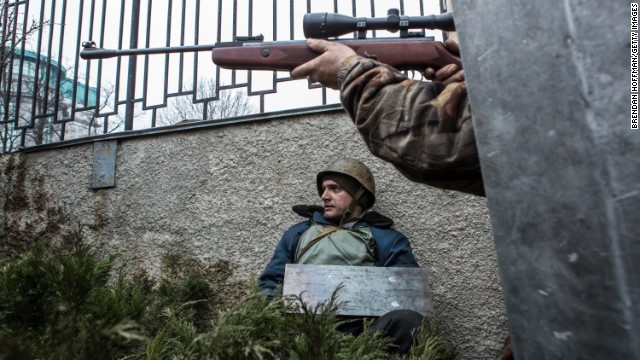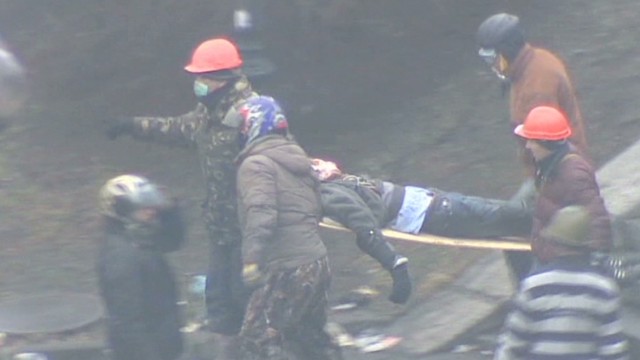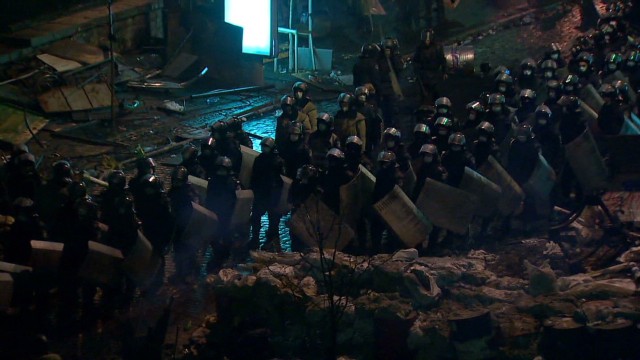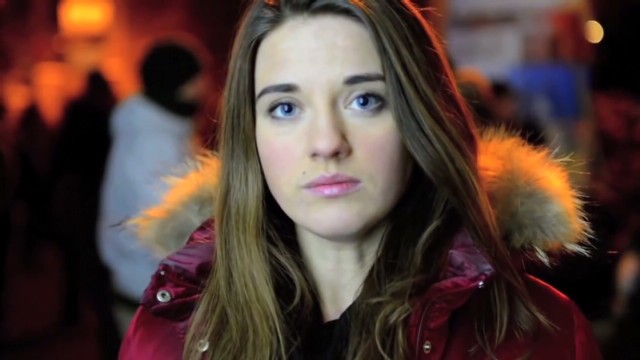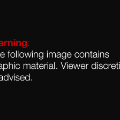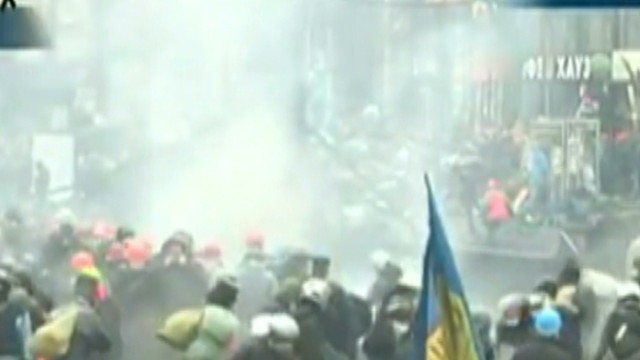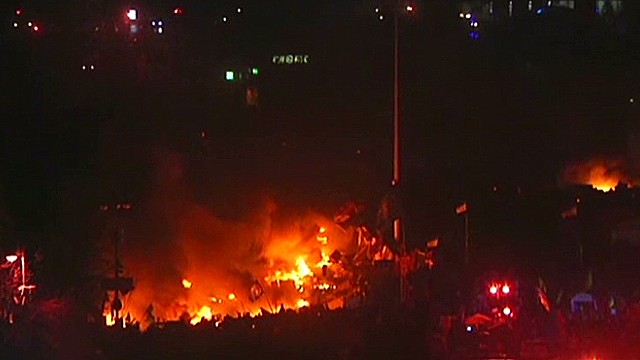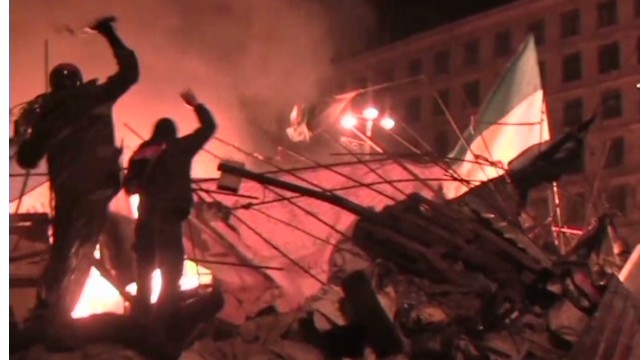Story highlights
- Polish Foreign Minister says talks with President and opposition ended early Friday
- Opposition says 100 killed in Kiev, the worst violence since the unrest began 3 months ago
- Talks involving Ukraine's president, opposition leaders and foreign diplomats are ongoing
- West threatens sanctions against government; Russia stands by it, against protesters
Protests. Talks. Violence. Protests. Talks. Violence.
By early Friday morning, the lone positive point was that -- for the time being -- Ukraine's cycle of political and physical infighting was not then at its bloodiest point, as it had been hours earlier.
Opposition medics said that 100 protesters died Thursday in clashes with police, when gunfire was unleashed.
The government places the toll much lower.
The health ministry puts the total death toll since Tuesday at 77. Twenty-six of them had been previously reported for Tuesday alone.
The health ministry puts the total death toll since Tuesday at 77. Twenty-six of them had been previously reported for Tuesday alone.
Another 577 people have been injured; 369 of those were hospitalized, the ministry said.
The Foreign ministers of Germany, France and Poland met with Ukrainian President Viktor Yanukovych and with the opposition overnight.
After dawn, Poland's top diplomat, Radoslaw Sikorski tweeted: "After negotiations through the night, talks ended at 7:20."
Prodded by the foreign diplomats, the key players were talking about not just a bandage for the violence but also a more long-term political solution and maybe the beginnings of healing.
Yet the facts of the last three months and, particularly, the last week show that it's way too early to celebrate or savor any peace. There have been two truces since Sunday. Each of them collapsed suddenly into carnage centered in Kiev's Maidan, or Independence Square.
The latest bloodshed was also the worst since the unrest began.
CNN crews at the scene reported that as security forces were moving away from the area after the latest truce, a group of protesters pursued them throwing rocks and Molotov cocktails.
Demonstrators did this all under a sky blackened by smoke from their burning barricades, with at least one of them firing toward police lines with a shotgun. Security forces appeared to fight back with automatic weapons and at least one sniper rifle.
In video shot by Radio Free Europe, men wearing what appear to be government uniforms fired at unseen targets with automatic rifles and a sniper rifle with a telescopic sight. CNN could not immediately confirm their target.
Another video shot by CNN shows a medic trying to help a man on the ground being felled by gunfire.
"I'm cleaning blood from the floor and I'm crying because this is really hard for me," said a man named Anton, who was volunteering at a protest medical clinic set up in a hotel.
Renewed violence
Interior Minister Vitali Zakharchenko said the violence had been "provoked exclusively by the opposition leaders," echoing an earlier statement from President Viktor Yanukovych's office accusing protesters of breaking the truce.
"The opposition used the negotiation period to buy time, to mobilize and get weapons to protesters," the statement from the President's office said.
However, a doctor volunteering to treat protesters, Olga Bogomolets, accused government forces of shooting to kill, saying she had treated 13 people she believed had been targeted by "professional snipers."
"They were shot directly to their hearts, their brain and to their neck," she said. "They didn't give any chance to doctors, for us, to save lives."
CNN could not independently confirm Bogomolets' claim of sniper fire.
At the hotel that had been converted into a triage center, bodies covered in bloodied sheets lay on the floor. Orthodox priests prayed over them.
The Interior Ministry admitted Thursday that its forces used firearms, explaining that it only did so to protect unarmed police who were in danger.
Ukraine's parliament later passed a resolution that security forces should stop using guns (something that's already illegal for protesters), back off from their positions around Maidan and denounce the "anti-terror" operation that had been announced earlier.
But whether this Thursday night resolution -- which doesn't need the president's signature -- has an impact remained to be seen.
In a statement that appeared to increase pressure on protesters, the Interior Ministry said it reserved the right to use force to free about 70 police officers it said had been taken hostage Thursday by protesters.
However, a number of people purporting to be police officers appeared on Ukrainian television saying they had joined protesters of their own free will. It wasn't clear whether those claiming to be police officers were among those allegedly taken hostage.
There was no sign of any captives when CNN crew went Thursday night to where they were thought to be held. A human rights group earlier claimed that any police who'd been held against their will had been released.
In one way, at least, Kiev got back to a semblance of normality Thursday. In addition to announcing his resignation from Ukraine's ruling party, the city's mayor Volodymyr Makeenko reopened the city's mass transit system -- which government officials had shut down to prevent protesters from reaching Independence Square.
But the unrest wasn't just in Kiev. Anti-government protesters have also hit the streets in Lviv -- about 540 kilometers west of Kiev, near the Polish border -- among other locales. Such sentiment is particularly prevalent in western Ukraine, which is more likely to side with Europe and against Yanukovych; Ukraine's east, meanwhile, has tended to support him and closer ties to Russia.
"The people gathering here represent every demographic of the city," said Jason Francisco, an Emory University professor who was one of many to submit CNN iReports from Lviv. "... It is fair to say that the city is virtually entirely behind the opposition. And this accounts for perhaps the most conspicuous thing about the situation here: The security presence is virtually nonexistent."
Roots of the crisis
The violence inflames a crisis that started in November, when Yanukovych reversed a decision to sign a trade deal with the European Union and instead turned toward Russia. Ukraine's population has long been divided between historic loyalties to Europe and its eastern neighbor.
The political strife has since ballooned well beyond that one issue, however, including the opposition's pressing constitutional reforms and to shift powers away from the president and to parliament.
And the bloodshed this get week has gotten the world's attention.
British Prime Minister David Cameron, for instance, talked by phone Thursday with his Polish counterpart as well as Russian President Vladimir Putin. German Chancellor Angela Merkel and U.S. President Barack Obama also discussed the Ukraine.
U.S. Vice President Joe Biden talked late Thursday with Yanukovych, who has also been in touch with Putin and U.N. Secretary-General Ban Ki-moon. In comments Thursday, the U.N. leader called for "genuine dialogue" and said he was "appalled by the use of firearms by both the police and protesters" -- even as he stressed it is crucial, especially, that authorities exercise restraint.
Russia, for one, has said it will send a mediator there at Yanukovych's request to negotiate with the opposition.
But the Russian ambassador to the U.N., Vitaly Churkin, said his government doesn't believe the opposition wants a dialogue. He accused protest leaders of invading government facilities as a buildup to a takeover of parliament.
"We think that this attempt to execute a violent coup should stop," he said.
Contrast that opinion to those expressed by Western officials, who have generally put more of the blame, and the responsibility, on the Ukrainian government.
U.S. Ambassador to Ukraine Geoffrey Pyatt told CNN on Thursday that "extremes on both sides are gathering strength" because of the instability. Even then, Pyatt said, "It's very clear that, for the United States, the preponderance of the responsibility rests with the President Yanukovych."
"Our position is (that) President Yanukovych needs to lead his country into a new future, and he needs to do so through the vehicle of a new government, change to the constitution and the political order."
The instability extends, too, to Ukraine's military, after its leader was replaced Wednesday by Yanukovych.
There have been no indications Ukrainian troops have been involved in the violence, having rather moved to protect their own facilities and weaponry, U.S. military spokesman John Kirby said. At the same time, the Ukrainian military's new leadership has been "unresponsive" to U.S. Secretary of Defense Chuck Hagel's attempts to communicate with them, according to Kirby.
Diplomatic efforts under way
After meeting in urgent session in Brussels, European Union officials agreed to freeze the assets of Ukrainians deemed responsible for the violence, and to prevent them from traveling into the European Union, the organization said in a statement.
"There is widespread horror in the European Union as well as in the United Kingdom at the scale of the loss of innocent life and the events of the last 48 hours," British Foreign Minister William Hague said.
The move comes a day after the United States announced it wouldn't give visas to 20 people, including government officials, tied to the unrest. Washington is also preparing an order to freeze assets of Ukrainians who are believed to be involved in the crackdown, a senior administration official said Thursday.
It's likely President Barack Obama will sign the order later in the day, but his administration is closely watching diplomatic efforts on the ground to make sure such a move won't be counterproductive, the administration official said.
Late Thursday, Secretary of State John Kerry called for the violence to stop and placed the bulk of the blame on one side.
"We unequivocally condemn the use of force against civilians by security forces, and urge that those forces be withdrawn immediately," he said in a statement.
He said Washington had already started implementing sanctions over the violence and directed an admonition at Yanukovych.
"There is no time for brinksmanship or gamesmanship," Kerry said. "President Yanukovich must undertake serious negotiations with opposition leaders immediately...."
The State Department also issued a travel warning to U.S. citizens, advising them to defer travel to the Ukraine due to the violence.
The foreign ministers of Germany, France and Poland met Thursday in Kiev with opposition leaders and Yanukovych. They had planned to attend the Brussels meeting, but talks went longer than expected, a German foreign ministry spokeswoman told CNN.
Late Thursday, Polish Foreign Minister Radoslaw Sikorski said via Twitter that the hourslong talks involving all sides had led to some "progress ... but important differences remain."
This comment came as Polish Prime Minister Donald Tusk said there is a proposal before Yanukovych for elections this year, the formation of a new government within 10 days of that election and revisions to the constitution by this summer, according to a statement from Tusk's office.
Pyatt, the U.S. ambassador, also said it was his understanding that Yanukovych had opened up to the idea of early elections.
Russia's foreign ministry appeared to criticize Western diplomatic efforts, according to a report by Russian state news agency RIA Novosti.
"The ongoing attempts to obtrusively intervene from outside, threat with sanctions or trying to influence the situation in any other ways are inappropriate and can't lead to anything good but can only aggravate the confrontation," the report quoted spokesman Aleksandr Lukashevich.
Analysts warned there was little that outside pressure could do, especially if the Ukrainian military gets involved on the side of the government cracking down on protesters.
"My own hunch," said Council on Foreign Relations President Richard Haass, "is this is going to continue to escalate."
